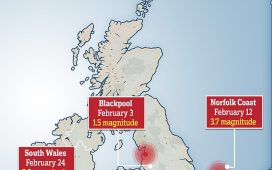[ad_1]
People often ask me about my brothers and sisters. They have read my debut novel, Girl A, and they expect to find my own family, encrypted in the fiction. There are seven siblings in the Gracie family in my book and between them there is caustic rage, begrudging respect, tenderness and cruelty. Too much love and too little.
I don’t have any brothers and sisters. That’s the thing about writers, I would like to reply, bolder than I really am. They make things up. Me, I’m nowhere to be found. Although that isn’t quite the case.
On one side of my family there is a history of siblings and on the other there are only children. My mother’s family is characterised by crammed festive tables; by three ice-creams a day on holiday and a cousin who once received an actual lump of coal for Christmas. My father’s family is the realm of the only children. Here, there were vast, empty houses, padded by feline companions. There were weekend visits to graves. With ease, the dead outnumbered the living.
But that’s the line that won out. I was a large, furious baby, decimating tissue and sleep. By the time I slept through the night, my parents were tiptoeing around their new, rejuvenated lives and everybody was too relieved to consider a second one.
I was never spoilt with stuff; I’m still the person who loses out on those perfect loafers, because I was trained to spend a week considering if I really, truly want them. But God, I was spoilt with time. I spent the first four years of my life with my mother, curating collages from magazines and choosing the book I wanted to read from my shelf. When I started at the village primary school, I cried for a month. I struggled, haplessly, with my tin of reading words and, to my horror, the teacher didn’t have six hours a day to dedicate to my conquering them.
Being an only child leaves you soft, I think. The world of adults isn’t necessarily kinder than the world of children, but it’s certainly more polite. I came to the classroom expecting that everybody would indulge my eccentricities, my animal facts and stories. That people would want to hear absolutely everything I had to say. As it turns out, nobody wants that and five-year-olds least of all. I cut a strange, gullible figure in the playground. Nobody had ever been mean to me and when they were, I couldn’t quite believe it was happening.
There were always stories, though. As soon as I mastered the reading tins, I liked to read stories full of siblings: to join the Weasleys at the Burrow and the Marches in Massachusetts. I added myself to their families, to their vast Christmases and shared jokes. And when I could write, I created my own novels of families; stapled pages of A4 sealed with the logo of my latest publishing house. I had a bounty of time and I didn’t have to worry about Amy March throwing my manuscript on the fire. As soon as I had finished these works, I would present them to my parents, who read them immediately, of course, and adored them.
When I was little, my parents would sometimes go for dinner and I was expected to be asleep by the time they came back. A forgettable babysitter sat downstairs with the television on louder than usual.
I never slept. I smelt my mother’s perfume in the landing, like an early ghost. I lay in bed waiting for their voices in the hallway, when I would know, for certain, that they had not died in a car accident on the way home. When they checked on me, I obediently feigned sleep, because there are few things more embarrassing than loving somebody too much.
There was something selfish in this love, of course. There was the suspicion that nobody else would ever love me quite so much, but that applies to most of us. More than that, there was the terror of being entirely alone. If my parents died, I thought, I would be sent away; and I wouldn’t be sent away like the Pevensies, evacuated together to swan about Narnia. No. I would be sent away by myself, with little sense of adventure, either to an orphanage, or to my grandparents’ house in Gloucestershire; the house of the only children, which was always dark, even on a midsummer afternoon.
I am much less lonely than I was then, but this fear has never quite gone away. It has only matured. I’m still preoccupied by the thought of my parents dying. I see myself at the church doors, alone. There will be nobody to recall their peculiarities and without that, I worry about losing the fondness that comes with death. Who’s going to know about the day that my father put diesel in the hire car and swore in front of me for the very first time? Who’s going to remember my mother’s enduring quests for a swimming pool on holiday, whatever the budget, so we once found ourselves jammed in a hotel bath in Seville, trying to cool down?
And here is the guiltiest fear: not death, but the absence of it. My maternal grandmother did not die of Alzheimer’s for many years and in those years my mother and aunt shared the black, black humour found in the corridors of care homes and hospitals; in the ring of the phone, at a time when nobody you know is awake. Will I be able to do it, I wonder – if the time comes? And not just to do it, but to do it graciously, with humour and to do it alone.
I wasn’t an easy child to teach and I am not particularly easy to love. ‘Your definition of compromise,’ my husband said, ‘is talking about something – and doing what you intended to do in the first place.’ This didn’t seem particularly impractical; it once surprised me that anybody would do things differently. When we moved in together, my assumption was that we would live according to my family’s lore. This was the time I ate dinner and this was the time I went to bed. Here were my books, arranged in alphabetical order by the author’s surname; and he could add his, provided we created a divide between fiction and nonfiction.
The men I loved always tended to come from big, sprawling families. There were houses full of brothers, too big for their rooms. The front door would open and nobody would know or check who had just arrived. I would sit in the midst of things, fascinated by the noise and the slights. If somebody had broken one of my CDs, I would have cried, or else taken an ear. Here, things were resolved in minutes, with cheerful violence. There was a whole abundance of shared jokes, a line from a film or a parental mishap, which became familiar over time. Familiar and forbidden. To raise them myself would have been mortifying: this much, I knew. This was not my native language and I would never lose my accent.
But for writing, this outsider perspective was useful. There is so much pleasure in writing not just about things that you don’t know, but about things that you can’t know; doors that are long-locked in reality, but can be nudged apart by your imagination. I imagined living in houses like these, surrounded by siblings and bustle. It’s never taken much for me to fall into the lives of others – a parted curtain of a dark evening can do it – and here was an opportunity to create my own siblings. Some of them were cruel and some of them were tender. All of them were mine.
If I’m to be found anywhere in Girl A, it is here. The Gracie family doesn’t come from something I have, but from something I don’t.
What’s useful for writing isn’t necessarily useful for a relationship. But I’m told that I’m improving. I appreciate the value of a pint midway through a walk, rather than insisting that we wait for the end of it. I can see the value in watching a film for the fifth time on a Sunday afternoon, the pleasure to be found in awaiting the best jokes, rather than hearing them anew. To our bookcase, we added an ‘unread bookshelf’, a stalwart of my husband’s shelves. I have acknowledged that this, if nothing else, is a better way of doing things.
All through my life, there have been times when I will tell people that I’m an only child and they will act surprised. You don’t write like an only child, they say; your novel, it was all about siblings. Or, you don’t seem like an only child. This is well-meaning at best and ignorant at worst. It is exactly who I am.
Girl A by Abigail Dean (HarperCollins, £8.99) is out now. Buy it for £8.36 from guardianbookshop.com
[ad_2]
READ SOURCE





